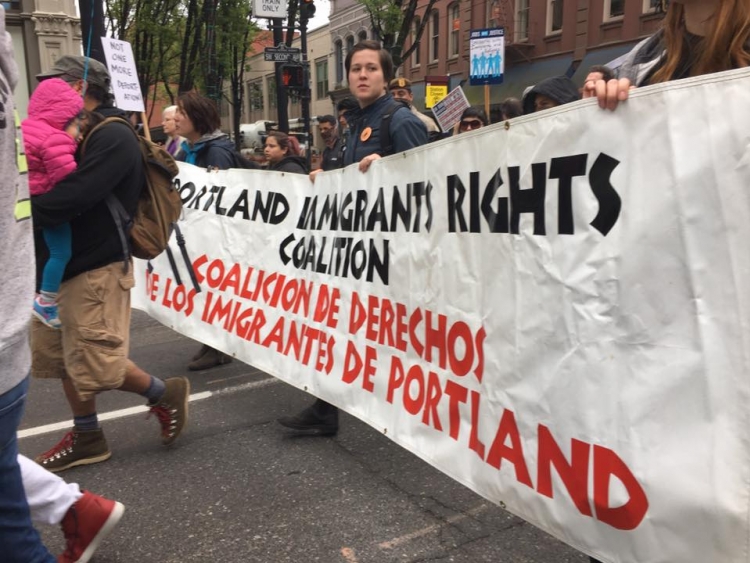
Oregon: In Portland, community members came together for All Power to the People: Rise Up, Resist, Unite, organized by the Portland May Day Coalition. Pedro Sosa / AFSC
Immigrant rights activists and other experts often complain that the immigration system is “broken” and needs to be reformed. But research suggests that this language can backfire. Focusing only on the problems – especially when it comes to complicated policies – shuts people down, makes them feel hopeless, and ends conversations. Instead of critiquing the system as broken, talk about what should be done to fix it and take action yourself.
Here’s why you shouldn’t say the system is broken:
- Reason #1: It makes people feel hopeless.
Calling the system broken makes people think that change would be very difficult. As the FrameWorks Institute has shown, this triggers fatalistic thinking and makes people shut down. Instead of listening to your critiques about what exactly is wrong with the immigration system and hearing your ideas about how to improve it, a person will most likely stop listening.
- Reason #2: It helps opponents of real humane reform.
No matter where you stand on immigration issues, you are likely to nod along when somebody says the system is broken. And there is a lot of room for improvement. Most notably, there are serious backlogs in visa processing that mean that a person may wait decades for a legal visa to become available. Even more pressing, there is currently no way for a person who lives in the United States without legal status to become a citizen – even if they have lived nearly their whole lives here, have children here, work and pay taxes here, and belong to communities here. These and other elements of the immigration system are inhumane – and must be reformed.
But when people who want to restrict immigration claim that the system is broken, what they often mean is that there are too many immigrants, and that immigration is a threat. Although it might seem like a good thing that many different people can agree that reforms are needed, calling out the system as broken seems to build more support for walls and a militarized border than it does for a pathway to citizenship.
Here are some solutions to propose instead:
Instead of speaking generally about the failures of the current system, talk about how shared values and the humane treatment of all should drive reforms.
- Appeal to our shared humanity. No matter where we were born, all people deserve to be treated humanely. Our immigration system does not recognize immigrants’ humanity when families are torn apart or when people are denied basic respect. Treating all people with compassion should be the goal of reform.
- Emphasize that change is possible, practical, and feasible. Research from the Frameworks Institute suggests this language will help persuade. Indeed in various polls, strong majorities consistently and increasingly support the idea that the United States should create a pathway to legal residency and citizenship for the members of our communities who don’t have them under the current system. That is where any conversation about fixing the immigration system should start.
- Take action now to protect immigrants in your community. Congress should pass meaningful reforms that make our immigration system more humane. But in the meantime, there is plenty you can do to make your community more inclusive. You can take action to protect sanctuary cities. And you can create "sanctuary everywhere" by tapping into these resources to make the spaces in your community more safe and welcoming.
Even in our current political climate, most people support the idea of a pathway to citizenship for our neighbors, family members, colleagues, and friends. Build support for humane, inclusive reform by talking about solutions and taking action to create sanctuary everywhere and making our communities safe and welcoming for all.